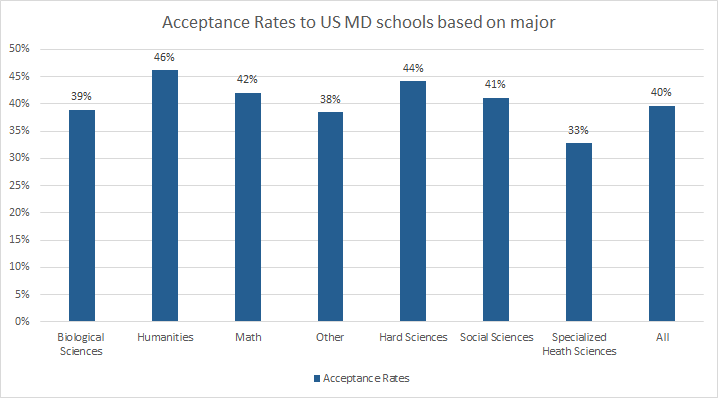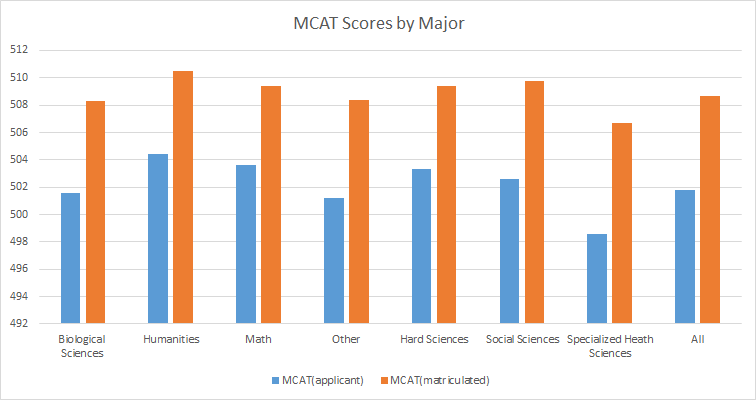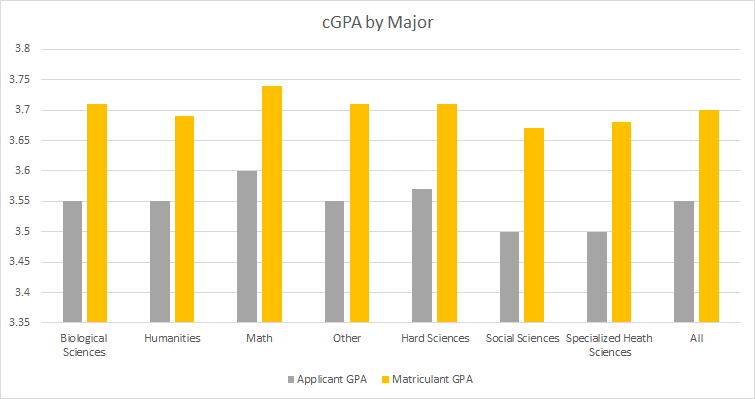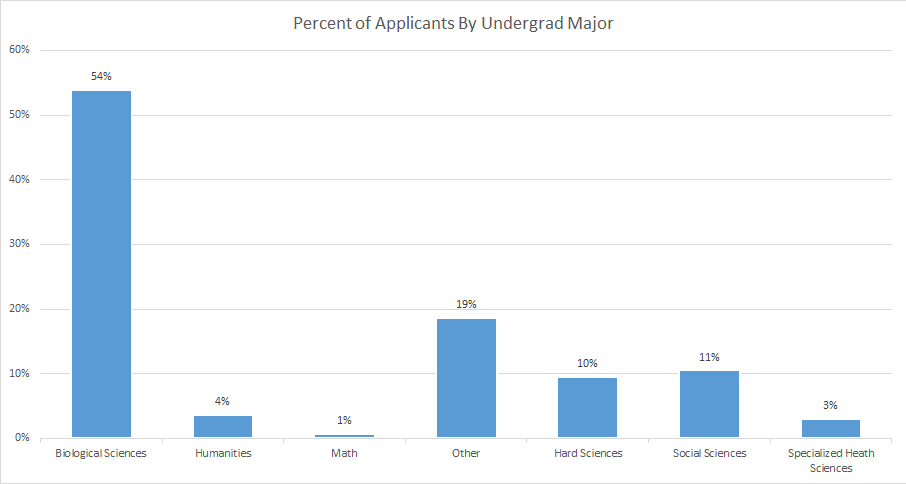- Joined
- Apr 9, 2017
- Messages
- 21
- Reaction score
- 13
The AAMC has a lot of data stratified by undergraduate major. Looking at table a17, there are a few interesting trends. I took the time to create graphical representations of the data.




There are a few things worth noting. Firstly, if it wasn’t iterated enough, majoring in biology or biological sciences is not required to get into medical school, although it is the most common route.
Secondly, humanities majors have the highest acceptances into medical school, followed by physical science majors. Conversely, biology and health science majors have some of the lowest.
Thirdly, humanities majors tend to do better on the MCAT, with biology majors and health science majors among the worst.
It is hard to say exactly why these trends occur, but it is possible that a lot of it is due to self-selection, i.e. the type of student who chooses to be a premed humanity major is different from the average cookie cutter biology premed student.
Accounting for the discrepancy within MCAT scores is interesting as well. The 2015 MCAT is heavily passage based, so it makes sense that reading-heavy majors do well.
Another interesting discussion is why specifically health science majors do so poorly in medical school admissions. My humble guess would be that those applying to medical school with specialized health care degrees have significantly lower MCAT/GPA combinations than matriculant stats per table a17, leading to significantly lower matriculation rates.
Ultimately, even humanities majors who are premed matriculate at a rate fairly close to the national average. It is safe to say that major does not matter, as can be confirmed by any adcom here. A dedicated and intelligent student is going to stand out no matter what he or she majors in, and can get into medical school. A good recommendation would be to major in what one enjoys and more importantly can succeed in.
A sidenote worth mentioning are engineering/cs majors which provide great fallback options if medical school does not work out. A thing to watch out with these majors is the rigor and workload of these majors, especially considering the difficulty needed to achieve a good gpa in the major. A student who wants to do this should be aware of the risks involved.
Sources:
https://www.aamc.org/download/321496/data/factstablea17.pdf
Thanks for reading. This was my first attempt at something like this, so let me know if you are interested in more or if you have any suggestions or improvements. Thanks!




There are a few things worth noting. Firstly, if it wasn’t iterated enough, majoring in biology or biological sciences is not required to get into medical school, although it is the most common route.
Secondly, humanities majors have the highest acceptances into medical school, followed by physical science majors. Conversely, biology and health science majors have some of the lowest.
Thirdly, humanities majors tend to do better on the MCAT, with biology majors and health science majors among the worst.
It is hard to say exactly why these trends occur, but it is possible that a lot of it is due to self-selection, i.e. the type of student who chooses to be a premed humanity major is different from the average cookie cutter biology premed student.
Accounting for the discrepancy within MCAT scores is interesting as well. The 2015 MCAT is heavily passage based, so it makes sense that reading-heavy majors do well.
Another interesting discussion is why specifically health science majors do so poorly in medical school admissions. My humble guess would be that those applying to medical school with specialized health care degrees have significantly lower MCAT/GPA combinations than matriculant stats per table a17, leading to significantly lower matriculation rates.
Ultimately, even humanities majors who are premed matriculate at a rate fairly close to the national average. It is safe to say that major does not matter, as can be confirmed by any adcom here. A dedicated and intelligent student is going to stand out no matter what he or she majors in, and can get into medical school. A good recommendation would be to major in what one enjoys and more importantly can succeed in.
A sidenote worth mentioning are engineering/cs majors which provide great fallback options if medical school does not work out. A thing to watch out with these majors is the rigor and workload of these majors, especially considering the difficulty needed to achieve a good gpa in the major. A student who wants to do this should be aware of the risks involved.
Sources:
https://www.aamc.org/download/321496/data/factstablea17.pdf
Thanks for reading. This was my first attempt at something like this, so let me know if you are interested in more or if you have any suggestions or improvements. Thanks!
